Sharing practical Word skills: The Word status bar is actually very practical!
It turns out that many people don’t pay much attention to the Word status bar, but it is actually very practical! The following article will give you an in-depth understanding of how to use the Word status bar. I hope it will be helpful to you!

#The Word status bar is located at the bottom of the interface. It is used to display relevant information of the current document, such as the number of document pages, current page number, word count, etc., without causing interference to the user. Under the premise, users can understand document-related information in real time, as shown in the figure.
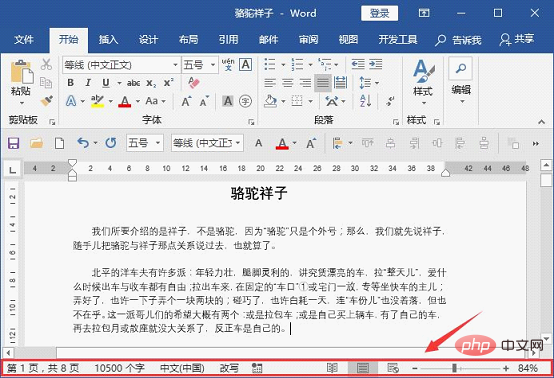
#However, many people don’t pay much attention to the status bar, but it is actually very practical. Today I will introduce to you the usage of the status bar.
1. Understand the status bar
After using Word for so long, do you know the meanings of the icons or information in the status bar? ? Think about it carefully, is there anything you really don’t know about... It doesn’t matter, I will give you some popular science below.
(1) Page number information
It is located on the far left side of the status bar. You can see how many pages there are in the document and what page the current position is, as shown in the figure Show. Use the mouse to click on the page number information in the status bar to quickly open the "Navigation" pane, where you can understand the document structure, adjust the title level, position the document, or move text, etc.
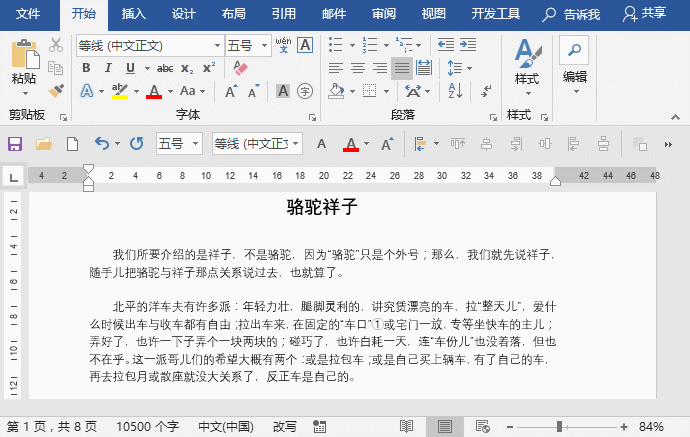
(2) Word count information
is located on the right side of the page number information, showing the total word count of the current document, a total of 10,500 characters ,As shown below. Click the word count information in the status bar to quickly open the "Word Count" dialog box to view information such as the number of pages, words, paragraphs, and lines in the document.
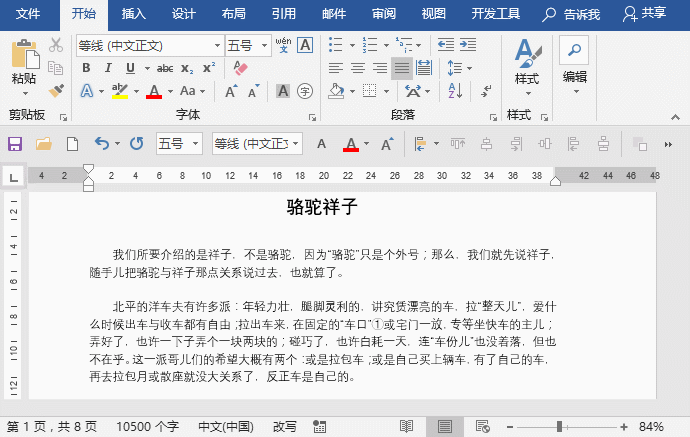
(3) Default language option
indicates that the current language is Chinese (China), click the default language in the status bar option to quickly open the "Language" dialog box, as shown in the figure.
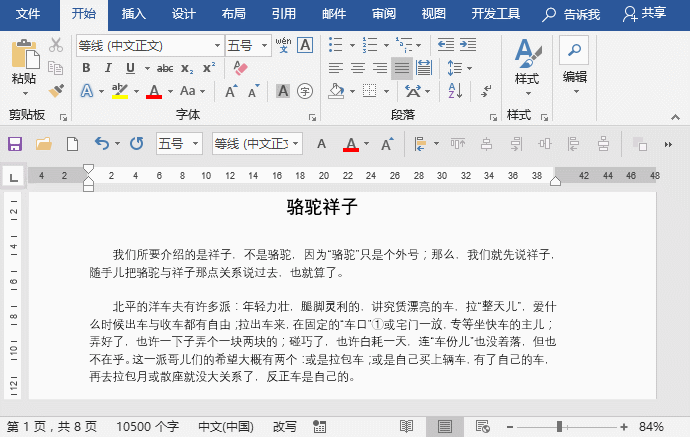
(4) Insert/Rewrite
Sometimes when we edit in Word, we often have typing overwrites, that is, Entering text in the middle of existing text will replace the following text. This is because you have turned on the "Rewrite" function. We only need to click "Rewrite" in the status bar, update it to "Insert", and then When entering text, there will be no typing overwrite. (If the status bar does not exist, right-click the status bar to display it).
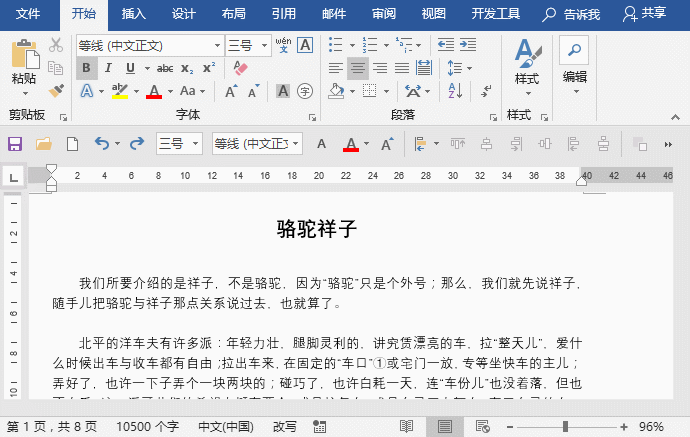
(5) Record Macro Button
Click the "Record Macro" button to quickly open the "Record Macro" dialog box . Save yourself the hassle of executing commands in the Developer tab.
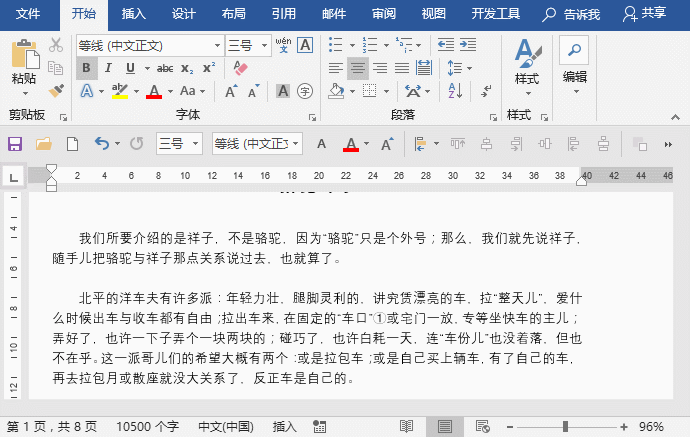
(6) View shortcut
The default view of Word is "Page View" mode, click " "Reading View", "Page View", and "Web Layout View" buttons can quickly switch view modes.
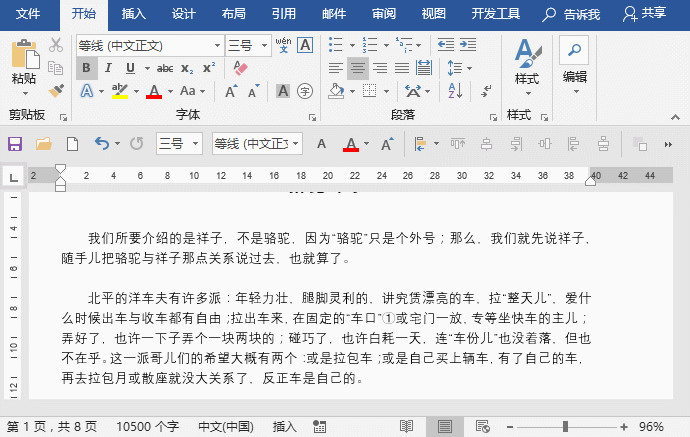
(7) Display ratio and zoom slider
is located on the far right side of the status bar, which can quickly adjust the display ratio of the document , the current ratio is "96%", you can drag the slider to quickly change the display ratio. In addition, click the scale number on the far right to open the "Display Scale" dialog box to set the scale.
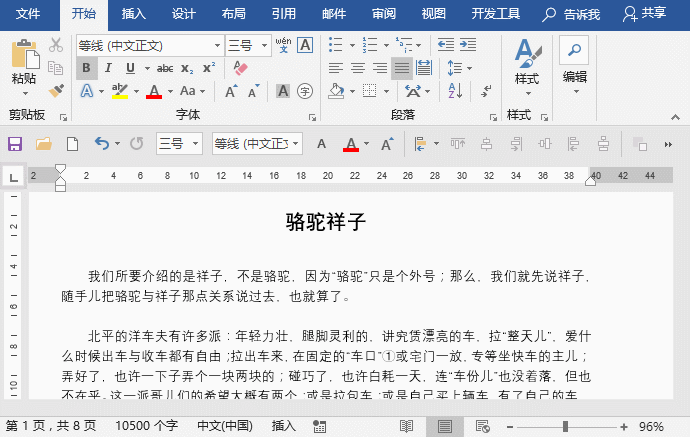
2. Customize the status bar
Because everyone has different working habits, when using Word The requirements for displaying information in the status bar are also very different. Some people need to display the line number, or do not need to display the default language option in the status bar. At this time, we can personalize the status bar according to our own document editing needs.
Right-click on the status bar and select the information that needs to be displayed in the current document in the pop-up shortcut menu, such as line number, revision, capitalization, etc.
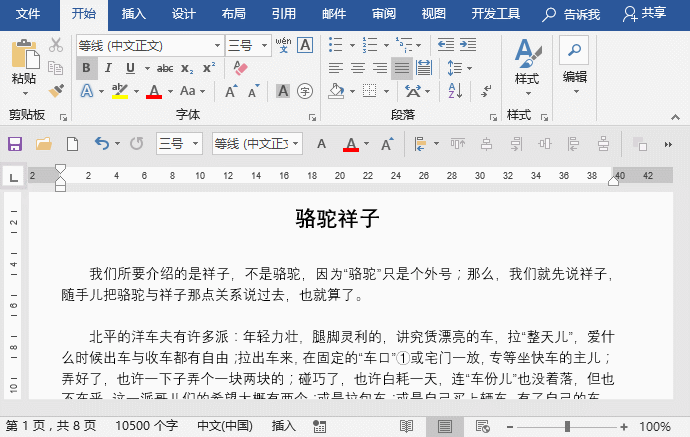
Therefore, when there is no information such as word count, insert/rewrite, view shortcuts, etc. in your Word status bar, right-click on the taskbar, and then check the corresponding option.
OK, let’s stop here today…
Recommended tutorial: "Word Tutorial"
The above is the detailed content of Sharing practical Word skills: The Word status bar is actually very practical!. For more information, please follow other related articles on the PHP Chinese website!

Hot AI Tools

Undresser.AI Undress
AI-powered app for creating realistic nude photos

AI Clothes Remover
Online AI tool for removing clothes from photos.

Undress AI Tool
Undress images for free

Clothoff.io
AI clothes remover

AI Hentai Generator
Generate AI Hentai for free.

Hot Article

Hot Tools

Notepad++7.3.1
Easy-to-use and free code editor

SublimeText3 Chinese version
Chinese version, very easy to use

Zend Studio 13.0.1
Powerful PHP integrated development environment

Dreamweaver CS6
Visual web development tools

SublimeText3 Mac version
God-level code editing software (SublimeText3)

Hot Topics
 1386
1386
 52
52
 How to cancel automatic word wrapping in word
Mar 19, 2024 pm 10:16 PM
How to cancel automatic word wrapping in word
Mar 19, 2024 pm 10:16 PM
When editing content in a word document, lines may automatically wrap. If no adjustment is made at this time, it will have a great impact on our editing and make people very headache. What is going on? In fact, it is a problem with the ruler. Below, I will introduce the solution to how to cancel automatic word wrapping in word. I hope it can help everyone! After opening a Word document and entering text, when you try to copy and paste, the text may jump to a new line. In this case, you need to adjust the settings to solve this problem. 2. To solve this problem, we must first know the cause of this problem. At this time we click View under the toolbar. 3. Then click the "Ruler" option below. 4. At this time we will find that a ruler appears above the document with several conical markers on it.
 Detailed explanation of how to display the ruler in Word and how to operate the ruler!
Mar 20, 2024 am 10:46 AM
Detailed explanation of how to display the ruler in Word and how to operate the ruler!
Mar 20, 2024 am 10:46 AM
When we use Word, in order to edit the content more beautifully, we often use rulers. You should know that the rulers in Word include horizontal rulers and vertical rulers, which are used to display and adjust the document's page margins, paragraph indents, tabs, etc. So, how do you display the ruler in Word? Next, I will teach you how to set the ruler display. Students in need should quickly collect it! The steps are as follows: 1. First, we need to bring up the word ruler. The default word document does not display the word ruler. We only need to click the [View] button in word. 2. Then, we find the option of [Ruler] and check it. In this way, we can adjust the word ruler! Yes or no
 How to add handwritten signature to word document
Mar 20, 2024 pm 08:56 PM
How to add handwritten signature to word document
Mar 20, 2024 pm 08:56 PM
Word documents are widely used due to their powerful functions. Not only can various formats be inserted into Word, such as pictures and tables, etc., but now for the integrity and authenticity of the files, many files require a manual signature at the end of the document. It sounds like this How to solve complex problems? Today I will teach you how to add a handwritten signature to a word document. Use a scanner, camera or mobile phone to scan or photograph the handwritten signature, and then use PS or other image editing software to perform necessary cropping on the image. 2. Select "Insert - Picture - From File" in the Word document where you want to insert the handwritten signature, and select the cropped handwritten signature. 3. Double-click the handwritten signature picture (or right-click the picture and select "Set Picture Format"), and the "Set Picture Format" pops up.
 How to set page margins for Word
Mar 19, 2024 pm 10:00 PM
How to set page margins for Word
Mar 19, 2024 pm 10:00 PM
Among office software, Word is one of our most commonly used software. The text documents we produce are generally operated with Word. Some documents need to be submitted in paper version as required. Before printing, the layout must be set before it can be presented. produce better results. So the question is, how do you set page margins in Word? We have specific course explanations to help you solve your doubts. 1. Open or create a new word document and click the "Page Layout" menu on the menu bar. 2. Click the "Margins" button of the "Page Setup" option. 3. Select a commonly used page margin in the list. 4. If there are no suitable margins in the list, click "Custom Margins". 5. The "Page Setup" dialog box pops up, enter the "Margins" option respectively.
 How to draw a dotted line in word
Mar 19, 2024 pm 10:25 PM
How to draw a dotted line in word
Mar 19, 2024 pm 10:25 PM
Word is a software that we often use in our office. It has many functions that can facilitate our operations. For example, for a large article, we can use the search function inside to find out that a word in the full text is wrong, so we can directly replace it. Make changes one by one; when submitting the document to your superiors, you can beautify the document to make it look better, etc. Below, the editor will share with you the steps on how to draw a dotted line in Word. Let's learn together! 1. First, we open the word document on the computer, as shown in the figure below: 2. Then, enter a string of text in the document, as shown in the red circle in the figure below: 3. Next, press and hold [ctrl+A] Select all the text, as shown in the red circle in the figure below: 4. Click [Start] on the top of the menu bar
 Where is the shading setting in word?
Mar 20, 2024 am 08:16 AM
Where is the shading setting in word?
Mar 20, 2024 am 08:16 AM
We often use word for office work, but do you know where the shading settings are in word? Today I will share with you the specific operation steps. Come and take a look, friends! 1. First, open the word document, select a paragraph of text paragraph information that needs to be added with shading, then click the [Start] button on the toolbar, find the paragraph area, and click the drop-down button on the right (as shown in the red circle in the figure below) ). 2. After clicking the drop-down box button, in the pop-up menu options, click the [Border and Shading] option (as shown in the red circle in the figure below). 3. In the pop-up [Border and Shading] dialog box, click the [Shading] option (as shown in the red circle in the figure below). 4. In the filled column, select a color
 Specific steps to delete down arrow in Word!
Mar 19, 2024 pm 08:50 PM
Specific steps to delete down arrow in Word!
Mar 19, 2024 pm 08:50 PM
In daily office work, if you copy a piece of text from a website and paste it directly into Word, you will often see a [down arrow]. This [down arrow] can be deleted by selecting it, but if there are too many such symbols, So is there a quick way to delete all arrows? So today I will share with you the specific steps to delete the downward arrow in Word! First of all, the [Down Arrow] in Word actually represents [Manual Line Break]. We can replace all [Down Arrows] with [Paragraph Mark] symbols, as shown in the figure below. 2. Then, we select the [Find and Replace] option on the menu bar (as shown in the red circle in the figure below). 3. Then, click the [Replace] command, a pop-up box will pop up, click [Special Symbols]
 Do you know how to sum a Word table?
Mar 21, 2024 pm 01:10 PM
Do you know how to sum a Word table?
Mar 21, 2024 pm 01:10 PM
Sometimes, we often encounter counting problems in Word tables. Generally, when encountering such problems, most students will copy the Word table to Excel for calculation; some students will silently pick up the calculator. Calculate. Is there a quick way to calculate it? Of course there is, in fact the sum can also be calculated in Word. So, do you know how to do it? Today, let’s take a look together! Without further ado, friends in need should quickly collect it! Step details: 1. First, we open the Word software on the computer and open the document that needs to be processed. (As shown in the picture) 2. Next, we position the cursor on the cell where the summed value is located (as shown in the picture); then, we click [Menu Bar




